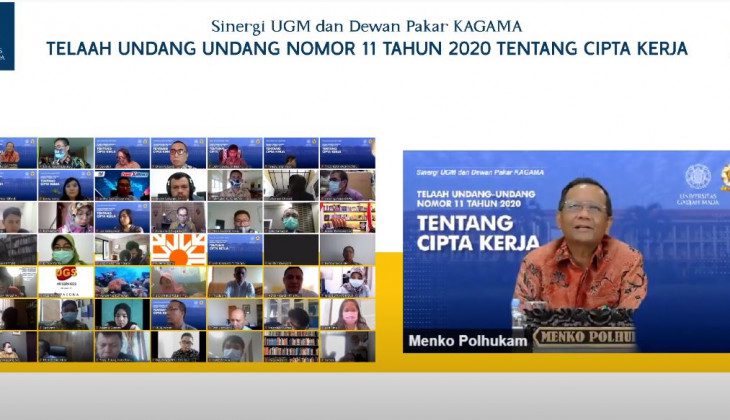Law No. 11 of 2020 concerning Job Creation has been officially issued and implemented by the government and the House of Representatives. Currently, the government is outlining regulations for the implementation of the Job Creation Law. They planned for 44 implementation regulations for the Job Creation Law drafted, consisting of 41 government regulations and three presidential regulations issued by 19 Ministries. However, the government will still consider the judicial review process in the Constitutional Court.
“The Job Creation Law is clearly already in force and binding, although there are still pros and cons,” said the Coordinating Minister for Political, Legal and Security Affairs, Mahfud MD, in a webinar entitled Review of the Job Creation Law organized by UGM collaborated with the KAGAMA Expert Council online on Tuesday (17/11).
Mahfud said that he appreciates the process taking place at the Constitutional Court concerning the judicial review of this law. He also supported that the government accepts every decision issued by the Constitutional Court. However, suppose the Constitutional Court later rejects the judicial review lawsuit. In that case, Mahfud recommended that some groups rejecting this law can submit revisions through the operation group that is currently outlining government regulations and the Presidential Decree.
He also added that this Job Creation Law opened up opportunities for investment entrance from both internal and abroad that sometimes hindered bureaucratic rules and statutory regulations.
The Coordinating Minister for the Economic, Airlangga Hartarto, said the Job Creation Law hopefully could encourage new job opportunities by increasing investment and protecting workers in the country. “Every year, 6.9 million people demand new jobs, 3.5 million workers have been laid off, and 3 million new workforces, so more than 10 million people need work every year,” he revealed.
He added that the Covid-19 pandemic had impacted 29.12 million Indonesians’ economies. The data reported that 2.56 million people became unemployed because 35.6 percent of companies chose to reduce their number. 70.53 percent of low-income groups whose income is below 1.8 million per month, and most rest experienced a decrease in income.
To answer this great challenge, he suggested that the government maintain and provide employment by trimming regulations because many regulations limit job creation. “The Job Creation Law is supposed to solve all of these problems based on productivity as a support for the economy,” he revealed.
He said the government is currently composing regulations for implementing the Job Creation Law, consisting of 41 Government Regulation Plans (PP) and 3 Presidential Plans involving 19 Ministers. Nevertheless, the government has created an open input from the public in public consultations for its preparation.
Professor of the Faculty of Social and Political Sciences UGM, Prof. Dr. Tadjuddin Noer Effendi, stated the basis for the formation of the Job Creation Law was to form an investment ecosystem in the country to make it better. Still, according to him, the implementation of this law is too late. “It should have been implemented 20 years ago on a major shift in our demographics, the movement of jobs shifting in our workforce from agriculture to industry,” he said.
A sound investment ecosystem should support economic and labor transformation and shift the workforce from agriculture to industry. This condition is due to a transformation process that will lead to a social change in business culture, job security, and old age security. “We cannot make it in our country because we do not have the investment ecosystem. The transformation of our workforce from agriculture has still not yet prevailed to industry. It tends to lead to the informal sector, in which 60 percent of our workforce is in the informal sector. Only 40 percent goes to the formal sector,” Tadjuddin said.
Workforce from this informal sector affects our workers more likely to pursue low-income jobs, irregular working hours, unprotected by law, even not obtaining assistance from the government. “This condition induces the causes of the high number of unemployment and poverty,” he said.
Meanwhile, the Governor of Central Java, Ganjar Pranowo, revealed data that not all articles in the Job Creation Law were declined by workers when they demonstrated against them the other day. According to Ganjar’s view, companies and workers have not met a common ground regarding outsourcing, overtime, and layoffs. Ganjar revealed that as many as 365 companies in Central Java had laid-off workers. Still, only 5 percent of the companies that could meet the severance pay requirement amounted to 32 times their salary. “The rest of 95 percent of companies have never done it. It keeps going every year. In my perspective, we have to make numbers sociologically since we never accomplish it. We need regulations to boost productivity and determine the wage scale structure at the company level,” he said.
Source: https://ugm.ac.id/id/berita/20369-pakar-kehadiran-uu-cipta-kerja-terlambat-20-tahun



